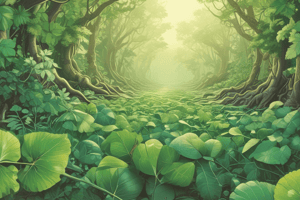Podcast
Questions and Answers
What is the scientific study of life and living organisms?
What is the scientific study of life and living organisms?
- Biology (correct)
- Geology
- Physics
- Chemistry
Which branch of biology studies the interactions between organisms and their environment?
Which branch of biology studies the interactions between organisms and their environment?
- Ecology (correct)
- Genetics
- Botany
- Microbiology
What is the primary function of carbohydrates in living organisms?
What is the primary function of carbohydrates in living organisms?
- To maintain blood pressure
- To transmit nerve impulses
- To provide structure and energy (correct)
- To regulate body temperature
What is the site of protein synthesis in a cell?
What is the site of protein synthesis in a cell?
What is the process by which cells generate energy from glucose?
What is the process by which cells generate energy from glucose?
What is the study of the evolution of living organisms?
What is the study of the evolution of living organisms?
What is the term for the variety of species in an ecosystem?
What is the term for the variety of species in an ecosystem?
What is the process by which species adapt to their environment?
What is the process by which species adapt to their environment?
Flashcards are hidden until you start studying
Study Notes
Definition and Scope
- Biology is the scientific study of life and living organisms
- It encompasses the structure, function, growth, evolution, distribution, and taxonomy of all living things
Branches of Biology
- Botany: study of plants
- Zoology: study of animals
- Microbiology: study of microorganisms (bacteria, viruses, etc.)
- Ecology: study of interactions between organisms and their environment
- Genetics: study of heredity, genes, and genetic variation
- Biochemistry: study of chemical processes and substances in living organisms
- Molecular Biology: study of biological processes at the molecular level
- Evolutionary Biology: study of the evolution of living organisms
Biological Molecules
- Carbohydrates: provide energy and structure (e.g., sugars, starches)
- Proteins: perform various functions (e.g., enzymes, hormones, structural proteins)
- Nucleic Acids: store genetic information (e.g., DNA, RNA)
- Lipids: provide energy and structure (e.g., fats, oils)
Cellular Structure and Function
- Cell membrane: regulates what enters and leaves the cell
- Cytoplasm: site of metabolic processes
- Nucleus: contains genetic material
- Mitochondria: site of cellular respiration
- Ribosomes: site of protein synthesis
Biological Processes
- Photosynthesis: process by which plants convert light energy into chemical energy
- Respiration: process by which cells generate energy from glucose
- Cell division: process by which cells reproduce
- Gene expression: process by which genetic information is used to create proteins
Ecosystems and Ecology
- Ecosystem: community of living and non-living components interacting with each other
- Biodiversity: variety of species in an ecosystem
- Food chains: series of organisms that eat other organisms
- Food webs: complex networks of food chains
Evolution and Natural Selection
- Evolution: change in species over time
- Natural selection: process by which species adapt to their environment
- Speciation: process by which new species emerge
- Adaptation: trait that helps an organism survive and reproduce in its environment
Definition and Scope of Biology
- Biology is the scientific study of life and living organisms
- It encompasses the structure, function, growth, evolution, distribution, and taxonomy of all living things
Branches of Biology
- Botany is the study of plants
- Zoology is the study of animals
- Microbiology is the study of microorganisms (bacteria, viruses, etc.)
- Ecology is the study of interactions between organisms and their environment
- Genetics is the study of heredity, genes, and genetic variation
- Biochemistry is the study of chemical processes and substances in living organisms
- Molecular Biology is the study of biological processes at the molecular level
- Evolutionary Biology is the study of the evolution of living organisms
Biological Molecules
- Carbohydrates provide energy and structure (e.g., sugars, starches)
- Proteins perform various functions (e.g., enzymes, hormones, structural proteins)
- Nucleic Acids store genetic information (e.g., DNA, RNA)
- Lipids provide energy and structure (e.g., fats, oils)
Cellular Structure and Function
- Cell membrane regulates what enters and leaves the cell
- Cytoplasm is the site of metabolic processes
- Nucleus contains genetic material
- Mitochondria is the site of cellular respiration
- Ribosomes is the site of protein synthesis
Biological Processes
- Photosynthesis is the process by which plants convert light energy into chemical energy
- Respiration is the process by which cells generate energy from glucose
- Cell division is the process by which cells reproduce
- Gene expression is the process by which genetic information is used to create proteins
Ecosystems and Ecology
- Ecosystem is a community of living and non-living components interacting with each other
- Biodiversity is the variety of species in an ecosystem
- Food chains are series of organisms that eat other organisms
- Food webs are complex networks of food chains
Evolution and Natural Selection
- Evolution is the change in species over time
- Natural selection is the process by which species adapt to their environment
- Speciation is the process by which new species emerge
- Adaptation is a trait that helps an organism survive and reproduce in its environment
Studying That Suits You
Use AI to generate personalized quizzes and flashcards to suit your learning preferences.




